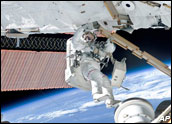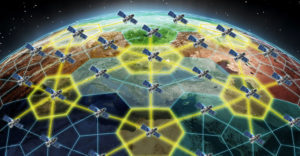
Computers aboard the international space station (ISS) are up and running once again, thanks to the efforts of flight controllers over the weekend, so the Space Shuttle Atlantis received the green light from mission managers to undock from the space station on Tuesday morning.
Two of three lanes on each of the two problematic computers are now operating normally, while the third on each is operational but in standby mode. The Mission Control Center in Moscow has restarted all Russian systems except the Elektron oxygen generation system, which has been powered but not yet started.
“This was good, old Russian ingenuity,” Paul Czysz, professor emeritus of aerospace engineering at St. Louis University, told TechNewsWorld. “They did some head-scratching, eliminated some possibilities, and figured it out.”
Bypassing the Problem
Success came when Russian crew devised a bypass cable around the computers’ power supply, thereby circumventing a part they suspected might have failed, he explained. “Lo and behold, within an hour the computers were back up and running,” Czysz said.
As a result, operations have returned to normal aboard the space station. The Atlantis crew completed their fourth space walk on Sunday, including activating a rotating joint that allows the newly installed starboard solar arrays to track the sun.
The problematic computers, which crashed last Wednesday, were responsible for the supply of oxygen and water to the crew, and also for maintaining the space station’s attitude, or angular position and rotation.
Attitude Control
Control moment gyroscopes aboard the space station are its primary system for controlling its attitude, while the two Russian computers provide backup attitude control. When the computers were down, the shuttle’s propulsion system helped to perform that function instead.
On Monday morning, flight controllers tested the computers’ ability to handle attitude control once again. Mission managers evaluated the results Monday afternoon, giving the computers a passing grade and confirming plans for the space shuttle to undock at 10:42 a.m. EDT on Tuesday, as scheduled. In preparation, the shuttle and space station crews will exchange farewells Monday evening before the hatches close at 6:23 p.m.
The Space Shuttle Atlantis arrived at the station June 10, bringing with it the new solar arrays as well as a new station crew member, Flight Engineer Clayton Anderson, who replaces astronaut Suni Williams. Williams arrived at the space station in December, and now holds the record for enduring the longest space flight a woman has ever made.
A Giant Money Pit?
The Russian and U.S. space agencies primarily operate the ISS, and agencies in Canada, Europe and Japan contribute to the station.
While there are certainly sighs of relief all around for the apparent safety of the international space station and its crew, there are some who believe the space station is a financial drain that doesn’t deliver enough value to justify its continued operation.
Author and lecturer Gregg Easterbrook, a visiting fellow at the Brookings Institution, wrote a scathing analysis of NASA’s priorities in Wired magazine last month that included calling the space station “pointless.”
An article in Time last week called it a “historic stinker” and “the most underachieving machine NASA ever dreamed up.”
Many others agree.
Time to Talk
“The Europeans, as far as I can see, don’t see any use for the space station, but think they ought to stay with it for the Americans,” Neville Woolf, University of Arizona professor of astronomy, told TechNewsWorld. “The Americans don’t see any use for it, but for the Europeans. Maybe they should get together and have a conversation.”
The space station uses a lot of resources that might be better deployed elsewhere, said Woolf, who is also astronomer of Steward Observatory and principle investigator of the University of Arizona team of the interdisciplinary NASA Astrobiology Institute (NAI).
“I suspect the real problem is that there are financial interests and organizations that make money from the running of the station,” he added.
“Until it becomes abundantly clear that there’s no use for the space station, we’re not going to get rid of it,” Woolf concluded. “If there could be some international discussion, maybe we could figure out something else to do with that money.”





















































